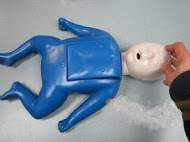When a baby has low-grade fever, it is usually triggered by an infection. Nevertheless, immunizations or overdressing a baby can also cause a low-grade fever. In case of an infection, the fever usually subsides within a few days. On the other hand, there are certain measures to take to ensure that the baby is comfortable while getting over the infection. When it comes to fever especially among infants and young children, it is best that you know what to do to provide relief. All you have to do is to register for first aid training today so that you can readily help out a loved one.
Provide fluids
A low-grade fever will make the child prone to dehydration. Babies under a year old are usually given an oral rehydration fluid. Take note that this type of fluid helps replace the lost electrolytes in the body. It is also important to encourage the baby to continue feeding on his/her normal schedule. Additionally, engage in quiet activities with the baby and allow him/her to rest as much as possible.

Bathing
You can soak the baby in a lukewarm bath to help reduce the fever and make him/her feel better. Allow the baby to stay in the bath for about 5-10 minutes. Once the baby starts to shiver, stop the bath right away. Take note that shivering will increase the internal temperature since the shaking movement produces heat, thus aggravating the low-grade fever. After the bath, the baby must be dressed in light clothing and make sure that the temperature inside the house is comfortable.
Medications
When a doctor is consulted, fever-reducing medications must be discussed. For a low-grade fever, the doctor might not recommend any medications since fever is the natural response of the body in order to fight off an infection. Once the fever is reduced, it can create a desirable environment for infection. In case the doctor recommends a medication, it is usually ibuprofen or acetaminophen for babies over 6 months old. Those below 6 months of age must not be given ibuprofen as well as aspirin since it is connected to a serious medical condition called Reye’s syndrome.
When to seek medical care
In case the baby is 3 months old or younger with a rectal temperature of 100.4 degrees or higher, a doctor must be consulted or simply bring the child to the emergency room as soon as possible. Always bear in mind that even a low temperature in a young infant can indicate a serious infection. Nevertheless, once the child is at least 3 months old, medical attention is not required unless the fever reaches 102.2 or higher. The other indications that the child needs medical care include irritability, diminished alertness as well as lack of appetite.
